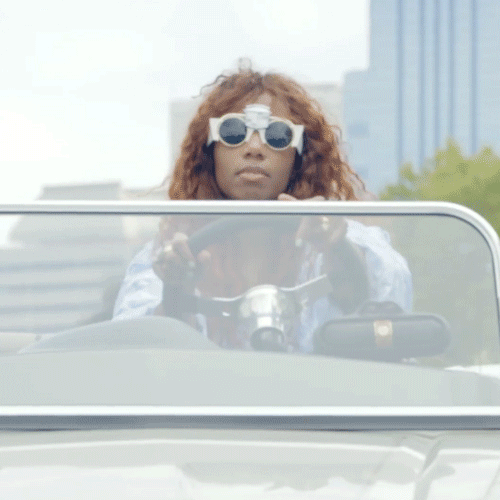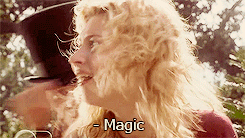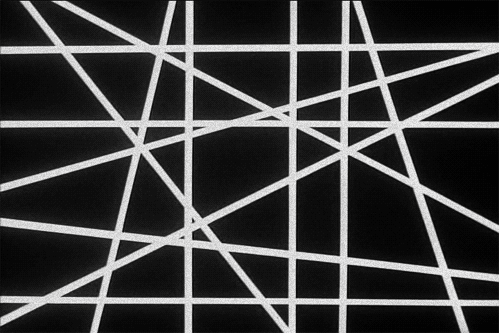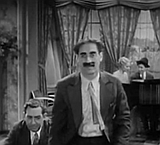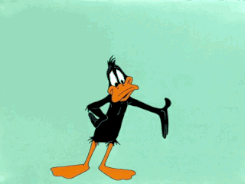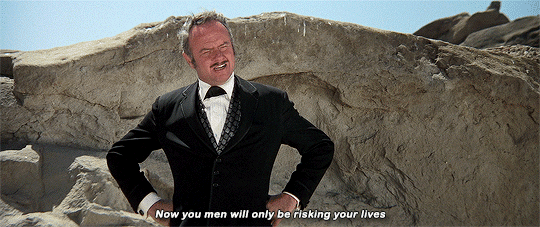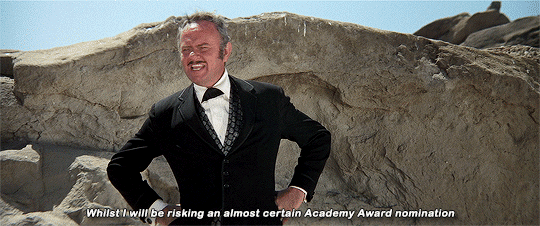With her third album Santigold continues to be one of the most unique and underappreciated musicians alive. This time, however, she's having a little more fun while she's doing it. Her magnificent sophomore record Master of My Make-Believe had an edge to it befitting of her punk rock roots as front woman Santi White of Stiffed. She told SPIN that on 99 Cents, which follows the birth of her son, she altered her point of view to create a more lighthearted but still provoking work that is every bit as eclectic as its predecessors.
The party starts immediately with the upbeat "Can't Get Enough of Myself." A vaguely doo-wop intro quickly segues into a synthy 80's girl group vibe. It could almost be a straightforward celebration of self-love but there's a noticeable undercurrent of irony suggesting displeasure with the vanity of social media and celebrity. The video, which features one of the most efficient uses of interactive media by a musician thus far, makes that point a little more clear. It puts the viewer's face into the background of a casual day in the life of Santigold including advertisements, dollar bills, and under a headline reading "America's Vanity Epidemic".
The first remnant of the aggression in Master of My Make-Believe is "Big Boss Bit Time Business but "Banshee" is far more explosive. The chorus erupts as Santigold pleads "let me play with fire tonight." The operatic "Before the Fire" is more of slow burn. White's vocals soar over tensely familiar tropical drums. Maybe the most morose is the sullen "Outside the War."
Santigold told SPIN that the quietly powerful "Run the Races" is about her reluctant attempts to keep up with the times and promote herself and her work on social media. It also calls to mind the struggles of society's underprivileged, as well as the efforts of anyone trying to stay in the game.
Santigold's new attitude is better represented by the likes of the driving, vaguely Parisian, "Rendezvous Girl." She is joined by hip hop crooner iLoveMakonnen on the R&B grooving "Who Be Loving Me." On "All I Got" she presents a carefree island lifestyle with a touch of romance and a chorus that encourages participation.
Finally, "Who I Thought You Were" serves as a bookend with "Can't Get Enough of Myself." Instead of challenging worship of the self it questions the identity of another being. Musically, it's back to the 80's, evoking the Go-Go's with its guitar driven pop-rock. In the opener Santigold sings "All I want to do is what I do well/ Ain't a gambler but honey I'd put money on myself." By the closer she's proven that she does music incredibly well and that's the safest bet going.
Friday, February 26, 2016
Friday, February 19, 2016
Did 'Man of Steel' Make Jerry Seinfeld Anti-PC?
To the many of us who were familiar with Jerry Seinfeld's work before he became the face of the Complaining About People Complaining About Political Correctness Committee it still feels like a bit of an odd turn for him. For decades there were two things you could rely on from Seinfeld; precise, polished, clean cut comedy and an intense adoration for that champion of truth, justice, and the American way known as Superman. Is it possible that the divisive 2013 film Man of Steel, based on Superman lore, played a part in turning the hero's most famous fan into a defender of crassness, insensitivity, and saying mean things?
When the movie came out Seinfeld seemed pretty excited about it, as evidenced by these tweets.
Seinfeld, on the other hand, has been pretty quiet about it, and diplomatic on the one occasion that he acknowledged the film. He was so excited for it and promised a review but kept his feeling to himself for six months. In the seventh month he was interviewed by Buzzfeed where he was asked about the lack of diversity on his web series Comedians in Cars Getting Coffee. He reacted defensively and unapologetically. Most would pinpoint the interview as the beginning of Seinfeld's battle with political correctness although it wasn't his first encounter with that specific issue. His landmark sitcom Seinfeld was pretty white but not much more so than any other show of the time. One episode, "The Diplomat's Club," had a story line about the character George attempting to prove himself not racist by making a friend out of a couple of black men he previously met in passing or whose home he invaded.
For over a year after the Buzzfeed interview Seinfeld was pretty quiet about the PC thing until he told ESPN radio that the grapevine had informed him of what inhospitable environments college campuses were to comedy. The same week he got involved in a conversation about the topic on Late Night with Seth Meyers where he called the whole thing "creepy." That's when he became a poster boy for the fight to say whatever you want all the time.
If I were to guess I would say Seinfeld's silence on Man of Steel may have been the result of not wanting to upset Warner Brothers, which no doubt has an aversion to having one of the most famous comedians in history bash the building block of their superhero cinematic universe. That could be why he turned his anger at the audience and their perceived attempts at censorship.
In the previously mentioned AMA Seinfeld was asked about his decision to keep his comedy clean. He said it was out of aspirations to appear on The Tonight Show Starring Johnny Carson and that he continued with it after reaching that goal to stand out from the crowd. Perhaps now that his fellow comics are trending towards watching their words Seinfeld is going in the other direction out of the desire to go against the grain that all creative people share.
One of the main themes of Seinfeld is the rules of polite society and the consequences of faux pas. The characters are constantly putting their feet in their mouths and dealing with the fallout. Maybe real life Jerry finally got so tired of playing by the rules and accepting the punishments of failure that he started to blame the game.
Despite Seinfeld's pristine reputation racial sameness was far from his show's only controversy. A certain contest comes to mind but modern "social justice warriors" aren't terribly concerned with sexual content. Homosexuality, on the other hand, is a matter of grave importance but on that front the show was somewhat progressive, at least for the 90's. Declaring "not that there's anything wrong with that" was practically a rainbow flag for 1993 and that episode actually earned a GLAAD Media award. If anything, it was a problem for a different, more conservative kind of PC culture, the remnants of which are still protesting things like gay comic book characters.
It's hard to claim moral superiority when your characters are as callous as the ones in Seinfeld. When George's fiance died in "The Invitations" he, Jerry, Elaine, and Kramer reacted with a cold detachment. In "The Marine Biologist," when Jerry goes out of his way to help a woman Elaine finds his charity so uncharacteristic that she suggests he's trying to sleep with the woman to which he replies "when Superman saves someone no one asks if he's trying to hit on her!" That's why I've always been fascinated by the passion for Superman shared by both the real and fictional Jerry Seinfeld. So powerful is the magnetic pull of the Metropolis Marvel's righteousness that it can affect even the moral compass of such cold and cynical people as the characters on Seinfeld.
Then in 2013 real life Jerry Seinfeld saw his hero take a man's life with his bare hands. I like to think that's where the problem started. Seinfeld saw the most hopeful, kind, and generous part of himself commit well intentioned manslaughter and it broke him. If Superman can perform the worst sin known to man maybe the "what's the deal with airline food?" guy can be an edgy voice of rebellion against censorship. If Superman can kill how good can Jerry Seinfeld be? If Superman can kill there must be something wrong with society. There can't be something wrong with Jerry Seinfeld. Perhaps Jerry Seinfeld is projecting his problems onto someone else.
When the movie came out Seinfeld seemed pretty excited about it, as evidenced by these tweets.
Seeing MOS this weekend.#willreport#justgladhezback— Jerry Seinfeld (@JerrySeinfeld) June 18, 2013
That review never came, not on Friday or any day for months. Half a year later in January, 2014 Seinfeld took part in a Reddit AMA (Ask Me Anything) where Man of Steel was brought up. Then he had this to say:I will be reviewing Man of Steel on Friday.#ThanksSuperfans— Jerry Seinfeld (@JerrySeinfeld) June 20, 2013
I was so happy that they made another Superman movie! I'm really reluctant to be critical of it in any way. But I thought the glossing over of the figuring out a secret identity and why he felt he needed one was a huge missed opportunity for that character, and one of the most interesting things about Superman is the whole secret identity. So to me it was too much action / violence and not enough character study.That's quite a modest response to a film so inflammatory from such an avid fan. My own response was borderline vehement and I'm something of a stoic myself, as well as a faithful follower of the final Kryptonian. I spent much of the movie desperately searching for something to like about it only to have something to hate slap me in the face. In the second before "Superman" snapped his foe's neck as if he were the main course for fried chicken night on the Kent farm time slowed down and I whispered "no." (At least I think I whispered. After the deed someone in the back cheered and I suppose it's possible they shouted "yes" in response to my "no" in the front.) I spent the rest of the night and most of the week in a daze trying to mediate between the optimism that I revere in the character and the film's total failure to honor that trait along with others on screen. Ever since I have been pretty vocal about the opinion I landed on which is "fervently unfavorable."
Seinfeld, on the other hand, has been pretty quiet about it, and diplomatic on the one occasion that he acknowledged the film. He was so excited for it and promised a review but kept his feeling to himself for six months. In the seventh month he was interviewed by Buzzfeed where he was asked about the lack of diversity on his web series Comedians in Cars Getting Coffee. He reacted defensively and unapologetically. Most would pinpoint the interview as the beginning of Seinfeld's battle with political correctness although it wasn't his first encounter with that specific issue. His landmark sitcom Seinfeld was pretty white but not much more so than any other show of the time. One episode, "The Diplomat's Club," had a story line about the character George attempting to prove himself not racist by making a friend out of a couple of black men he previously met in passing or whose home he invaded.
For over a year after the Buzzfeed interview Seinfeld was pretty quiet about the PC thing until he told ESPN radio that the grapevine had informed him of what inhospitable environments college campuses were to comedy. The same week he got involved in a conversation about the topic on Late Night with Seth Meyers where he called the whole thing "creepy." That's when he became a poster boy for the fight to say whatever you want all the time.
If I were to guess I would say Seinfeld's silence on Man of Steel may have been the result of not wanting to upset Warner Brothers, which no doubt has an aversion to having one of the most famous comedians in history bash the building block of their superhero cinematic universe. That could be why he turned his anger at the audience and their perceived attempts at censorship.
In the previously mentioned AMA Seinfeld was asked about his decision to keep his comedy clean. He said it was out of aspirations to appear on The Tonight Show Starring Johnny Carson and that he continued with it after reaching that goal to stand out from the crowd. Perhaps now that his fellow comics are trending towards watching their words Seinfeld is going in the other direction out of the desire to go against the grain that all creative people share.
One of the main themes of Seinfeld is the rules of polite society and the consequences of faux pas. The characters are constantly putting their feet in their mouths and dealing with the fallout. Maybe real life Jerry finally got so tired of playing by the rules and accepting the punishments of failure that he started to blame the game.
Despite Seinfeld's pristine reputation racial sameness was far from his show's only controversy. A certain contest comes to mind but modern "social justice warriors" aren't terribly concerned with sexual content. Homosexuality, on the other hand, is a matter of grave importance but on that front the show was somewhat progressive, at least for the 90's. Declaring "not that there's anything wrong with that" was practically a rainbow flag for 1993 and that episode actually earned a GLAAD Media award. If anything, it was a problem for a different, more conservative kind of PC culture, the remnants of which are still protesting things like gay comic book characters.
It's hard to claim moral superiority when your characters are as callous as the ones in Seinfeld. When George's fiance died in "The Invitations" he, Jerry, Elaine, and Kramer reacted with a cold detachment. In "The Marine Biologist," when Jerry goes out of his way to help a woman Elaine finds his charity so uncharacteristic that she suggests he's trying to sleep with the woman to which he replies "when Superman saves someone no one asks if he's trying to hit on her!" That's why I've always been fascinated by the passion for Superman shared by both the real and fictional Jerry Seinfeld. So powerful is the magnetic pull of the Metropolis Marvel's righteousness that it can affect even the moral compass of such cold and cynical people as the characters on Seinfeld.
Then in 2013 real life Jerry Seinfeld saw his hero take a man's life with his bare hands. I like to think that's where the problem started. Seinfeld saw the most hopeful, kind, and generous part of himself commit well intentioned manslaughter and it broke him. If Superman can perform the worst sin known to man maybe the "what's the deal with airline food?" guy can be an edgy voice of rebellion against censorship. If Superman can kill how good can Jerry Seinfeld be? If Superman can kill there must be something wrong with society. There can't be something wrong with Jerry Seinfeld. Perhaps Jerry Seinfeld is projecting his problems onto someone else.
Friday, February 12, 2016
Three Greatest Illusionists who are Actual Magicians
When I was little I began to doubt Santa Claus's existence when I realized just how desperately every Christmas movie was trying to prove it. In contrast, every movie about illusionists focuses on proving them to be frauds. No matter how convincing the trick in the end it's nothing more than smoke, mirrors, and misdirection. That's why I love stories where the opposite happens; someone who appears to be a typical stage magician is revealed to have bona-fide supernatural abilities. The new TV series The Magicians caught my attention because I assumed it was about that very thing. Although it is fantastic and quickly becoming one of my favorite shows among steep competition, it has very little to do with illusionists. For this particular craving I am once again left to feed on morsels. The scarcity and admitted inadequacy of these stories is regrettable, but perhaps their specificity and "quirkiness" only lends to the mystical quality of these unique few.
My first memory of this very narrow trope comes from a 2005 Disney Channel Original Movie. Like many people of my generation, DCOMs fill a special place in my excessively nostalgic heart. Now You See It... may not be as well remembered as Zenon or Halloweentown for example, but it ignited my imagination like no other. If nothing else it deserves credit for originality as a member of this exclusive club where every member is different. It aired when I was becoming a bit too old for Disney Originals and as such it is one of the last DCOM's that I have any feelings about whatsoever. It starred Aly Michalka, who is perhaps best known now for her role in the fantastic supernatural detective series iZombie but at the time was in the middle of Disney's Phil of the Future. She played an aspiring producer who discovered a prodigy, Danny (Johnny Pacar), for a magic reality contest show. Before long Michalka's character discovered that Danny could perform acts of real magic as could the man behind the competion, Max, played by the magnificent Frank Langella. Danny and Max briefly form a mentorship until Max reveals his wicked intentions, at which point they battle before Danny goes into hiding. Of course, the ending was made to feel as uplifting as possible but it really wasn't as triumphant and ending as you would expect from the source, which is further proof of its peculiarity.
The most famous example of an actual sorcerer masquerading as a fraudulent performer is the DC Comics hero Zatanna Zatara. She is a frequent member of the Justice League and has appeared in various adaptations including Smallville and perhaps the potential Guillermo Del Toro film based on the Justice League Dark series. She inherited both her sorcery and her occupation from her father, John Zatara, who first appeared in 1938. They perform spells by speaking backwards. A recent example from someone outside the family is "noil sdrib," which resulted in bird lions. As per usual for comic book characters, Zatanna is great at everything she does. She is one of the most powerful people in the DC Universe and still she has perfected a thrilling stage act that has no necessity of the supernatural. She stands out from the typical superhero for her theatrical appearance; a top hat, tuxedo top, and fishnet stockings. Also, doesn't seem to have ever had any interest in a secret identity. As a civilian she's a public performer and as an adventurer she just wears her stage costume without any facial concealment. Her chosen career involves tricking people into thinking she has magical abilities even though she really does have magical abilities, a fact that she makes no attempt to hide. I suppose audiences just need to take it on faith that when she's pretending to do magic she really is lying to them and trust that a respected Justice League member would never lie to them about lying to them.
Now You See It...
My first memory of this very narrow trope comes from a 2005 Disney Channel Original Movie. Like many people of my generation, DCOMs fill a special place in my excessively nostalgic heart. Now You See It... may not be as well remembered as Zenon or Halloweentown for example, but it ignited my imagination like no other. If nothing else it deserves credit for originality as a member of this exclusive club where every member is different. It aired when I was becoming a bit too old for Disney Originals and as such it is one of the last DCOM's that I have any feelings about whatsoever. It starred Aly Michalka, who is perhaps best known now for her role in the fantastic supernatural detective series iZombie but at the time was in the middle of Disney's Phil of the Future. She played an aspiring producer who discovered a prodigy, Danny (Johnny Pacar), for a magic reality contest show. Before long Michalka's character discovered that Danny could perform acts of real magic as could the man behind the competion, Max, played by the magnificent Frank Langella. Danny and Max briefly form a mentorship until Max reveals his wicked intentions, at which point they battle before Danny goes into hiding. Of course, the ending was made to feel as uplifting as possible but it really wasn't as triumphant and ending as you would expect from the source, which is further proof of its peculiarity.
Zatanna/Zatara
The most famous example of an actual sorcerer masquerading as a fraudulent performer is the DC Comics hero Zatanna Zatara. She is a frequent member of the Justice League and has appeared in various adaptations including Smallville and perhaps the potential Guillermo Del Toro film based on the Justice League Dark series. She inherited both her sorcery and her occupation from her father, John Zatara, who first appeared in 1938. They perform spells by speaking backwards. A recent example from someone outside the family is "noil sdrib," which resulted in bird lions. As per usual for comic book characters, Zatanna is great at everything she does. She is one of the most powerful people in the DC Universe and still she has perfected a thrilling stage act that has no necessity of the supernatural. She stands out from the typical superhero for her theatrical appearance; a top hat, tuxedo top, and fishnet stockings. Also, doesn't seem to have ever had any interest in a secret identity. As a civilian she's a public performer and as an adventurer she just wears her stage costume without any facial concealment. Her chosen career involves tricking people into thinking she has magical abilities even though she really does have magical abilities, a fact that she makes no attempt to hide. I suppose audiences just need to take it on faith that when she's pretending to do magic she really is lying to them and trust that a respected Justice League member would never lie to them about lying to them.
Thriller: "Dark Legacy"
Anthology series like The Twilight Zone gave great imaginative minds, namely Rod Serling, the perfect outlet for their sci-fi and horror stories. There's a pretty good chancy that any of your favorite recent sci-fi stories are little more than an imitation of a Serling script. In this case however, that honor goes to Thriller, the series hosted by horror icon Boris Karloff. The episode stars Harry Townes as an illusionist who rapidly rises through the ranks when his uncle bequeaths him a book of occult origins. He uses the book to summon a demon, an act that rarely if ever goes well. He carries the hellish agreement through to its inevitable end despite warnings from his well intentioned friend played by the Rat Pack adjacent Henry Silva. Overall it's a decent piece of 50's horror. The opening scene of the uncle's death while garbed in full wizardry attire is remarkable all on it's own. Although, it isn't quite the affirmation of the wonders of a magical world hiding in plain sight that I like to idealize. Actually, it's closer to The Magicians; a glimpse at the dangers of the supernatural lurking behind a deceptively childlike veneer. All it needs is a good quarter-life crisis and Harry Townes could be Quentin Coldwater.
Friday, February 5, 2016
Four Greatest Broken Fourth Walls Ever
Next week Deadpool is arriving in theaters. From the very beginning of the promotion for this film the title character has been speaking into camera and making meta jokes as he is wont to do. This movie is potentially the most meta film that has ever been made but absolutely not the first. It is only a continuation of a long tradition of comedies that have broken the fourth wall; a tradition that will likely continue even farther when Disney cowboys up and does something with my Pearls Before Swine script.
There are few things in modern comedy that wasn't done better by the Marx Brothers over half a century ago. They may not have invented meta-comedy but when they used it they did so with as much precision as they did everything else. In some ways Groucho is one of Deadpool's clearest predecessors. He was a joke assassin with deadly accuracy who could also be extraordinarily silly as he drew ire from those around him as much with his stinging insults as with his absurdity, and yes, at times he broke the fourth wall. The best example is in the Brothers' classic Horse Feathers. As Chico is just beginning one of his typical piano numbers his dearest brother Groucho walks straight up to the camera and says "I've got to stay here but there's no reason why you folks shouldn't go out into the lobby until this thing blows over." As wonderful as that joke is, there were at least a couple of reasons to stay in the theater. Not only is Chico a fairly impressive pianist but it's just not worth the risk of missing any more Groucho jokes.
Where Marvel has Deadpool, DC Comics have a superhero character named Animal Man who also knows that he is fictional. In place of Deadpool's antics Animal Man's reaction to this realization is nearly tragic, a philosophical tale of what happens when one realizes that they lack control in a big crazy universe. Somewhere in between is Daffy Duck in the Looney Tunes classic "Duck Amuck." The short begins like any other and Daffy enters prepared for a swashbuckling adventure. He swings his rapier threateningly at a nonexistent foe and advances right past the background, finding himself in a white void. He prompts the animator and a paintbrush enters the frame to deliver a quaint farm scene instead of a 17th century French castle. Daffy changes his wardrobe just in time to saunter from the farm to the arctic. For the next five minutes the all powerful hand of the animator tortures the Duck, at one point erasing him out of existence until the only thing on screen is a bill. According to director Chuck Jones it was all a test of the strength of Daffy as a character, supposedly saying "who is Daffy Duck anyway? Would you recognize him if I did this to him? What if he didn't live in the woods? Didn't live anywhere? What if he had no voice? No face? What if he wasn't even a duck anymore?"
For some reason wall breaking is hard to do successfully on TV. Just ask all the Community fans, myself included, who had to beg and plead for each new season. Two decades before the phrase "six seasons and a movie" was ever uttered there was It's Garry Shandling's Show. It was kind of like Seinfeld (which premiered two years later) if all the characters were at least vaguely aware that they were on TV and Jerry was very aware to the point that instead of doing stand up in a comedy club he delivered expository monologues while facing the camera, treating the audience like another character. The show was so self-aware that the theme song contained lyrics of how it came into existence; "Garry called me up and asked if I would write his theme song." Fortunately the show was successful enough to last four season and earn as many Emmy nominations without so much as a single hashtag.
Mel Brooks is one of cinema's greatest wall breakers. Since some of his most famous movies are parodies of other movies it makes sense for self-awareness to be a key element. There are a lot of moments to choose from. The "Abott and Costello Meet Inception" from Spaceballs is a strong contender but the clear winner comes from the end of Blazing Saddles. It is perhaps the funniest, and certainly most literal, broken fourth wall since Juliet asked the audience where Romeo was. It also might be one of the greatest surprise endings since Macbeth's butler did it (I haven't seen that movie), so this might get into spoiler territory. After a long battle between a noble sheriff and corrupt politicians, a fight broke out, then broke through a literal wall onto a sound stage where another film was being shot. The rest of the fight takes place throughout the Warner Bros. lot, climaxing with a shootout in front of the theater where Blazing Saddles is premiering. A few characters even go inside the theater. I always thought it would be incredible if someone dressed like the characters walked in to the actual theater at that moment. You know, there are an awful lot of Deadpool cosplayers out there.
Horse Feathers
Duck Amuck
It's Garry Shandling's Show
For some reason wall breaking is hard to do successfully on TV. Just ask all the Community fans, myself included, who had to beg and plead for each new season. Two decades before the phrase "six seasons and a movie" was ever uttered there was It's Garry Shandling's Show. It was kind of like Seinfeld (which premiered two years later) if all the characters were at least vaguely aware that they were on TV and Jerry was very aware to the point that instead of doing stand up in a comedy club he delivered expository monologues while facing the camera, treating the audience like another character. The show was so self-aware that the theme song contained lyrics of how it came into existence; "Garry called me up and asked if I would write his theme song." Fortunately the show was successful enough to last four season and earn as many Emmy nominations without so much as a single hashtag.
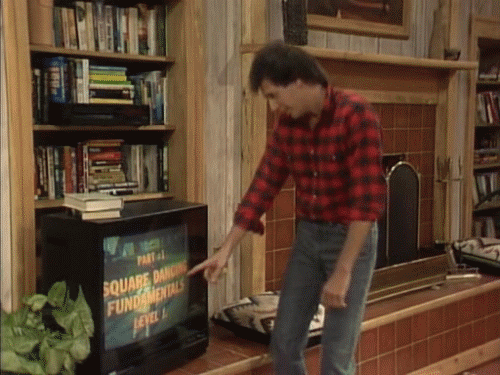 |
| It's surprisingly difficult to find gifs of late 80's semi-forgotten cult classics. |
Blazing Saddles
Mel Brooks is one of cinema's greatest wall breakers. Since some of his most famous movies are parodies of other movies it makes sense for self-awareness to be a key element. There are a lot of moments to choose from. The "Abott and Costello Meet Inception" from Spaceballs is a strong contender but the clear winner comes from the end of Blazing Saddles. It is perhaps the funniest, and certainly most literal, broken fourth wall since Juliet asked the audience where Romeo was. It also might be one of the greatest surprise endings since Macbeth's butler did it (I haven't seen that movie), so this might get into spoiler territory. After a long battle between a noble sheriff and corrupt politicians, a fight broke out, then broke through a literal wall onto a sound stage where another film was being shot. The rest of the fight takes place throughout the Warner Bros. lot, climaxing with a shootout in front of the theater where Blazing Saddles is premiering. A few characters even go inside the theater. I always thought it would be incredible if someone dressed like the characters walked in to the actual theater at that moment. You know, there are an awful lot of Deadpool cosplayers out there.
Subscribe to:
Comments (Atom)
